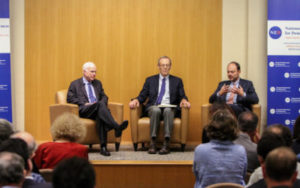Bellingcat said the “voluminous” data implicates eight members of a clandestine group of Russia’s FSB, a successor to the Soviet-era KGB responsible for domestic intelligence. The unit specializes in working with chemical weapons, Bellingcat said.
 “By analyzing call metadata, overlapping flight records, and previously leaked offline databases, we have identified at least fifteen operatives who work within this clandestine poisoning sub-unit of the FSB Criminalistics Institute. At least eight of these — including their supervisor [Stanislav] Makshakov — had direct involvement in various stages of what appears to have been multiple attempts to poison Alexey Navalny,” the report says, RFE/RL adds (above).
“By analyzing call metadata, overlapping flight records, and previously leaked offline databases, we have identified at least fifteen operatives who work within this clandestine poisoning sub-unit of the FSB Criminalistics Institute. At least eight of these — including their supervisor [Stanislav] Makshakov — had direct involvement in various stages of what appears to have been multiple attempts to poison Alexey Navalny,” the report says, RFE/RL adds (above).
“I know who wanted to kill me,” Navalny said in a video message about Bellingcat’s joint investigation with Russia’s Insider website, Germany’s Der Spiegel news magazine and CNN. “I know where they live. I know where they work. I know their real names. I know their fake names. I have photographs of them.”
So what made Navalny, who has faced sporadic pressure and attacks for years, but in the main allowed to operate, suddenly unacceptable? a leading analyst asks.
 One could speculate about his “Smart Voting” initiative, in the lead-up to the local elections, which certainly did cause some concern for United Russia. Or suggestions of a tie-up with other opposition groups, even the Communists. However, these do not seem so threatening, so different, as to explain anything themselves. Instead, the alarming possibility is that they mark a paradigm shift on the Kremlin’s part, argues analyst Mark Galeotti, author of The Vory: Russia’s Super Mafia.
One could speculate about his “Smart Voting” initiative, in the lead-up to the local elections, which certainly did cause some concern for United Russia. Or suggestions of a tie-up with other opposition groups, even the Communists. However, these do not seem so threatening, so different, as to explain anything themselves. Instead, the alarming possibility is that they mark a paradigm shift on the Kremlin’s part, argues analyst Mark Galeotti, author of The Vory: Russia’s Super Mafia.
Maintaining the appearance of genuine politics, of not just the zombie “systemic opposition” parties but also a degree of grassroots activism and civil society, has been an integral aspect of how it manages the country. This is no Stalinism, not even a Chinese-style one-party state, he writes for the Moscow Times:
Instead, it is, appropriately enough, a hybrid system, with a small amount of real democracy and a larger helping of fake democracy, mobilized to make oligarchic authoritarianism both more efficient and more tolerable. In its own terms, it has more or less worked for years. Yet above all this year we have seen more and more signs that the old men in the Kremlin and Old Square (the Presidential Administration), to say nothing of the big grey building on Bolshaya Lubyanka Street (the actual headquarters of the FSB these days), are getting more worried, more intolerant, and less imaginative.
All of these suggest a retreat into what Andrei Kolesnikov has called ‘bunkerisation,’ a less agile, confident and inclusive approach to government, Galeotti adds. RTWT

Vladimir Kara Murza (far right) with NED’s Carl Gershman (center) and Senator John McCain
Analysts have been forecasting mass protests in Russia for 2024, the year Putin will probably seek another term in violation of constitutional limits, adds Vladimir Kara-Murza (far right). The Kremlin’s change of plan for the Duma election could bring the clock forward. And the test in September will be not just for the resilience of Russian civil society, but also for the West’s adherence to its principles. At a recent European Parliament hearing, Navalny urged Western leaders to refuse to recognize the results of the Duma vote if opposition candidates are blocked from the ballot, he writes for the Post.
Latest Navalny Investigation Puts an Increasingly Paranoid Kremlin on the Spot https://t.co/vZrODO7AQm
— Democracy Digest (@demdigest) December 15, 2020







